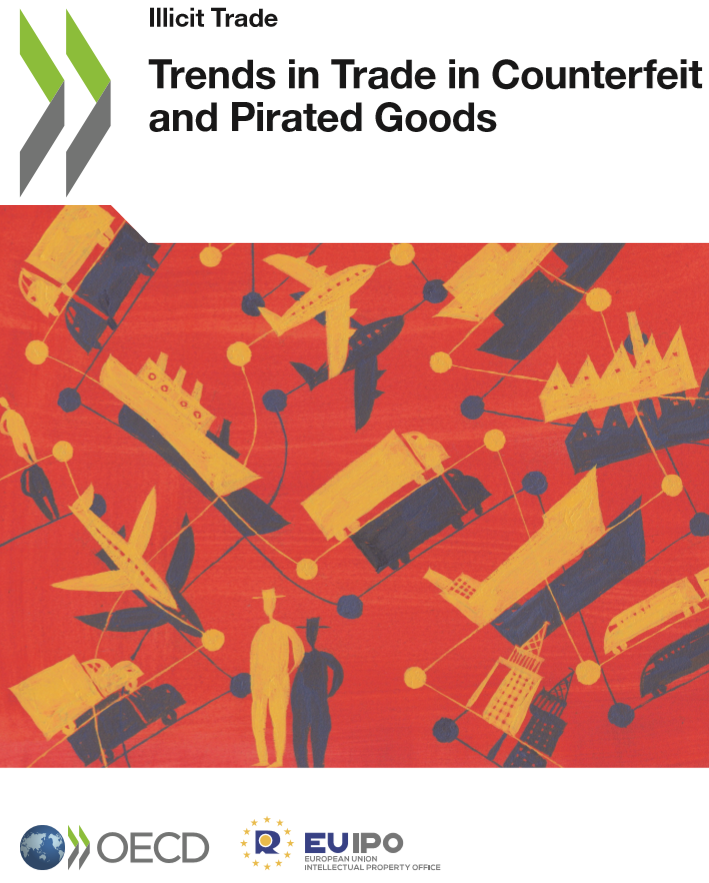

EUIPO/OECD Report: Trends in Trade in Counterfeit and Pirated Goods
In March 2019, the European Union Intellectual Property Office (EUIPO) and the Organisation for Economic Cooperation and Development (OECD) published a study estimating the total value of counterfeit and pirated goods traded both globally and on EU level. The new report updates the original analysis from 2016. According to the report, the intensity of counterfeiting and piracy is clearly on the rise.

The new EUIPO/OECD report, based on data from 2016, estimates that the total value of counterfeit and pirated goods traded globally is as much as EUR 460 billion (USD 509 billion). This represents up to 3.3% of the world trade. The previous study estimated that in 2013 up to 2.5% of world trade was in counterfeit and pirated goods, equivalent to up to EUR 338 billion (USD 461 billion). This means that the share of trade in counterfeit and pirated goods in global trade grew significantly in just three years. It should be noted that the results do not include domestically produced and consumed counterfeit and pirated products or pirated digital content on the Internet.
Turning to assessment of the situation in the EU, the results show that in 2016, imports of counterfeit and pirated products into the EU amounted to EUR 121 billion (USD 134 billion), which represents up to 6.8% of all EU imports. The growth is notable also in the EU, as in 2013 the portion was 5%.
Most counterfeits and pirated goods originate from China and Hong Kong (China). Other countries and regions from where these goods mainly come from include the UAE, Turkey, Singapore, Thailand, India and Malaysia. Companies that suffer the most from counterfeiting and piracy are primarily registered in OECD countries such as the United States, France, Italy, Switzerland, Germany, Japan, Korea and the United Kingdom.
According to the study, the fake products can be found in a large number of industries, such as common consumer goods, IT goods and luxury items. The report underlines that many fake goods, especially food and beverages, pharmaceuticals and medical equipment can pose serious health and safety risks for consumers. The study also interestingly shows that the use of small shipments, counterfeits sent mostly by post or express services, keeps growing. The proliferation of small shipments raises the cost of checks and detention for customs. Therefore, it introduces significant challenges for enforcement authorities.
Christian Archambeau, the Executive Director of the EUIPO, stated that:
“Counterfeiting and piracy pose a major threat to innovation and economic growth, at both EU and global level. The rise in the share of counterfeit and pirated goods in world trade is deeply concerning, and clearly calls for coordinated action, at all levels, to be fully tackled.”
This growing trend is indeed worrying – especially for the brand owners.
The full report and the executive summary, which is published in various languages, can be found here. For more information on how to tackle counterfeiting and piracy, please contact us via email at: info@lexdellmeier.com.
Related
- 1 December 2017: Madrid Monitor takes its place as the one and only tool for tracking international trademarks
- 1 January 2020 - Changes in Classifications - Trademarks, Designs, Patents and Utility Models
- 100th Anniversary of Bavaria (Germany) - A glance at trademarks, start-ups, innovation & events
- 10th Anniversary Edition - 10 Things to Know about LexDellmeier - Past, Present & Future
- 15 Years LexDellmeier - 2024 New Year Wishes
- A new legal EU framework regulating Artificial Intelligence
- All these small Gimmicks – Trademark Infringement?
- Another year older…
- António Campinos will be the new EPO President from June 2018
- Arguments gone with the wind: the EGC upholds a decision concerning a potential one-letter “e” mark
